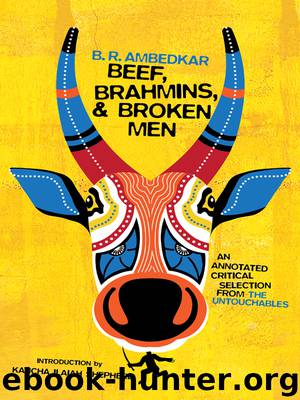Beef, Brahmins, and Broken Men by B. R. Ambedkar

Author:B. R. Ambedkar
Language: eng
Format: epub
Tags: HIS017000, History/Asia/India & South Asia, PHI034000, Philosophy/Social
Publisher: Columbia University Press
Published: 2020-03-10T00:00:00+00:00
Chapter XIV
Why should beef-eating make broken men Untouchable?
The stoppage of beef-eating by the Brahmins and the non-Brahmins and the continued use thereof by the Broken Men had produced a situation which was different from the old. This difference lay in the fact that while in the old situation everybody ate beef, in the new situation one section did not and another did. The difference was a glaring difference. Everybody could see it. It divided society as nothing else did before. All the same, this difference need not have given rise to such extreme division of society as is marked by Untouchability. It could have remained a social difference. There are many cases where different sections of the community differ in their foods. What one likes the other dislikes and yet this difference does not create a bar between the two.
There must therefore be some special reason why in India the difference between the Settled Community and the Broken Men in the matter of beef-eating created a bar between the two. What can that be? The answer is that if beef-eating had remained a secular affair—a mere matter of individual taste—such a bar between those who ate beef and those who did not wouldn’t have arisen. Unfortunately beef-eating, instead of being treated as a purely secular matter, was made a matter of religion. This happened because the Brahmins made the cow a sacred animal. This made beef-eating a sacrilege. The Broken Men being guilty of sacrilege necessarily became beyond the pale of society.
The answer may not be quite clear to those who have no idea of the scope and function of religion in the life of the society. They may ask: Why should religion make such a difference? It will be clear if the following points regarding the scope and function of religion are borne in mind.
To begin with the definition1 of religion. There is one universal feature which characterises all religions. This feature lies in religion being a unified system of beliefs and practices which (1) relate to sacred things and (2) which unite into one single community all those who adhere to them.2 To put it slightly differently, there are two elements in every religion. One is that religion is inseparable from sacred things. The other is that religion is a collective thing inseparable from society.3
The first element in religion presupposes a classification of all things, real and ideal, which are the subject matter of man’s thought, into two distinct classes which are generally designated by two distinct terms the sacred and the profane, popularly spoken of as secular.4
This defines the scope of religion. For understanding the function of religion the following points regarding things sacred should be noted:
The first thing to note is that things sacred are not merely higher than or superior in dignity and status to those that are profane. They are just different. The sacred and the profane do not belong to the same class. There is a complete dichotomy between the two. As Prof
Download
This site does not store any files on its server. We only index and link to content provided by other sites. Please contact the content providers to delete copyright contents if any and email us, we'll remove relevant links or contents immediately.
| Arms Control | Diplomacy |
| Security | Trades & Tariffs |
| Treaties | African |
| Asian | Australian & Oceanian |
| Canadian | Caribbean & Latin American |
| European | Middle Eastern |
| Russian & Former Soviet Union |
The Secret History by Donna Tartt(19088)
The Social Justice Warrior Handbook by Lisa De Pasquale(12190)
Thirteen Reasons Why by Jay Asher(8910)
This Is How You Lose Her by Junot Diaz(6887)
Weapons of Math Destruction by Cathy O'Neil(6280)
Zero to One by Peter Thiel(5802)
Beartown by Fredrik Backman(5754)
The Myth of the Strong Leader by Archie Brown(5507)
The Fire Next Time by James Baldwin(5446)
How Democracies Die by Steven Levitsky & Daniel Ziblatt(5219)
Promise Me, Dad by Joe Biden(5153)
Stone's Rules by Roger Stone(5088)
A Higher Loyalty: Truth, Lies, and Leadership by James Comey(4964)
100 Deadly Skills by Clint Emerson(4925)
Rise and Kill First by Ronen Bergman(4789)
Secrecy World by Jake Bernstein(4753)
The David Icke Guide to the Global Conspiracy (and how to end it) by David Icke(4720)
The Farm by Tom Rob Smith(4512)
The Doomsday Machine by Daniel Ellsberg(4490)
